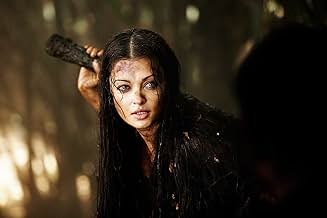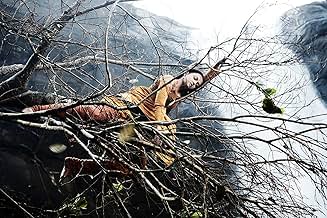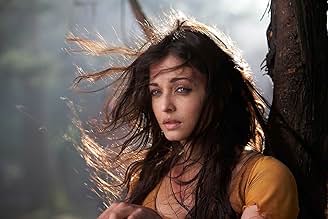Raavanan
- 2010
- 2h 8m
IMDb RATING
6.9/10
4.9K
YOUR RATING
A bandit leader kidnaps the wife of the policeman who killed his sister, but later falls in love with her.A bandit leader kidnaps the wife of the policeman who killed his sister, but later falls in love with her.A bandit leader kidnaps the wife of the policeman who killed his sister, but later falls in love with her.
- Awards
- 4 wins & 8 nominations total
Featured reviews
Cud hv been great,, but for some mindless typical bollywoody popular chunks.....
Ravanan is probably one of the hardest movies for which I'll be writing a review for. For most people who have already watched the movie, when they think in retrospect, it becomes easy to term it as 'very disappointing; or 'a complete waste of their time'. Well for one thing, this verdict shows the still conservative, yet to be unconventional mindset of the general audience towards Indian cinema. The most important aspect that I learnt after watching the movie was that, one cannot ever question a filmmaker's viewpoint, especially not of someone who has brought Indian cinema to great heights with movies such as guru and Bombay. Usually in the initial phase, a director has his thoughts aligned in a manner which only he can understand. It is converted to the screen only when he brings his ideas to everyone's comprehension. It is the latter fact that Mani Ratnam has not brought to complete satisfaction, which though he might be clear of, in a way puzzles the audience. In this film, the director has made us understand the importance of looking through a particular situation or argument through a different perspective, more specifically, a perspective which we might fear to judge. Ravanan can be said to have a definite storyline comprising that of a modern storyteller's as well as the ancient sage's. The modernized and refurbished version of the Ashokavanam episode and lanka war is re-enacted and cinematographed in different locations with different character descriptions and names, different, yet similar situations and most importantly looking from a different viewpoint, the perspective of Raavana himself, who we are accustomed to the knowledge that he is the villain.
The idea is different and definitely in the best of its ways. Not everyone is ready to take a blind shot at the vague parts of an epic like Ramayan and Mani Ratnam to the most part has handled the concept well. The support team including the expert actors have contributed to their best and have brought their abilities to near perfection. Vickram as Veera steals the movie with ease, giving one of his best performances. The fierceness in his depiction of modern day Raavana is apt and does quite a lot of justice to Valmiki's image of Raavana. Aishwariya rai who plays Ragini, modern day Sita otherwise, gives another artwork that will always remain as one of her pioneer roles and so do Prithviraj and Priyamani who play Dev (lord Rama) and modern day Shoorpanaka respectively. On the technical front, the music though not the best work of A.R. Rahman does pure justice to the theme of the story and BGM gives you a wonderful thrill. But, the most exemplary aspect of Ravanan is the direction of photography by Santosh Sivan and V. Manikandan. The lens men have captured the scenes in a manner seen never before in Indian cinema. The location, the camera angles and clarity are brought to near precision and gives the most delicious treat to the eyes of the viewers.
So what could be the possible letdown for the movie, to begin with, it lacks clarity towards the climax which most usually matters to the audience because it is the final sequence that tend to have the final impression on them. The ending is clouded with smoke giving no clear idea of the exact feelings of Ragini toward Veera and the tryout of grey shading Prithviraj's character tends to be a little more than required. The scene where he ruthlessly shoots Veera's brother gives us a feeling of hate towards dev and love for Veera. Apart from all these things, once you step out of the movie hall, you are forced to think back about the story, about the characters and most importantly, whether you liked the movie or not, you have a propensity of conflict in your mind about who was right and who was wrong. After all that's what cinema is all about, the primary aim is to make the audience analyze and contemplate and Mani Ratnam pulls of that objective with finesse. With Ravanan, the director has carved himself a niche in greatest epitome of Indian Cinema.
The idea is different and definitely in the best of its ways. Not everyone is ready to take a blind shot at the vague parts of an epic like Ramayan and Mani Ratnam to the most part has handled the concept well. The support team including the expert actors have contributed to their best and have brought their abilities to near perfection. Vickram as Veera steals the movie with ease, giving one of his best performances. The fierceness in his depiction of modern day Raavana is apt and does quite a lot of justice to Valmiki's image of Raavana. Aishwariya rai who plays Ragini, modern day Sita otherwise, gives another artwork that will always remain as one of her pioneer roles and so do Prithviraj and Priyamani who play Dev (lord Rama) and modern day Shoorpanaka respectively. On the technical front, the music though not the best work of A.R. Rahman does pure justice to the theme of the story and BGM gives you a wonderful thrill. But, the most exemplary aspect of Ravanan is the direction of photography by Santosh Sivan and V. Manikandan. The lens men have captured the scenes in a manner seen never before in Indian cinema. The location, the camera angles and clarity are brought to near precision and gives the most delicious treat to the eyes of the viewers.
So what could be the possible letdown for the movie, to begin with, it lacks clarity towards the climax which most usually matters to the audience because it is the final sequence that tend to have the final impression on them. The ending is clouded with smoke giving no clear idea of the exact feelings of Ragini toward Veera and the tryout of grey shading Prithviraj's character tends to be a little more than required. The scene where he ruthlessly shoots Veera's brother gives us a feeling of hate towards dev and love for Veera. Apart from all these things, once you step out of the movie hall, you are forced to think back about the story, about the characters and most importantly, whether you liked the movie or not, you have a propensity of conflict in your mind about who was right and who was wrong. After all that's what cinema is all about, the primary aim is to make the audience analyze and contemplate and Mani Ratnam pulls of that objective with finesse. With Ravanan, the director has carved himself a niche in greatest epitome of Indian Cinema.
A good adaption of the epic Ramayana to a movie experience. Conveyed the core of the story in a simple manner with a terrific performance from the crew, especially Vikram. The Portrayal of the veera character and the conversations between the lead role stands out in the movie. Hats off to Mani Ratnam for staging this movie in a great way and for the locations. The mood of the scenes is expressed more by the way they are made than by the dialogues (a typical MR way of storytelling). As usual ARR's BG score and songs add great value and strength to the movie. A good movie to watch. Just give it a watch!!!!!!!!!!
I watched this movie again after 10 years and my viewing has been better now . This film underplayed many things and definitely it's not a love film ..different way of storytelling and movie is worth for Chiyan alone ...Though I'm a thalapathy Vijay fan Chiyaan impresses me all the time
There is a terrifying sequence during Mani Ratnam's Raavanan, or 'Villain' out of the Tamil language and into the English one, that sees two hard-bodied men, both specialists in what it is they do either side of the line of the law, duking it out on board a delicate rope bridge hovering above a drop, which will bring about certain death, as its gradual falling apart syncs up with how much the two men's hating of one another escalates during this fight – such are the lengths you'd probably go for Aishwarya Rai. The sequence carries with it a great deal of both horror and trepidation, principally because it is as a fight to the death and we genuinely feel someone is going to get seriously hurt, but additionally because we are inclined naturally to get behind one man and yet are simultaneously invited to root for the other. This recent Indian film, about the good guy not necessarily being all that nice and the titular villain not necessarily being as evil nor as one dimensional as one would assume, is a sweeping and deeply involving piece; a film it is difficult not to get as involved in as I did; a film with a concise and interesting idea at its core, before efficiently going on to explore such items in an exciting and cinematic manner.
We begin with a series of sequences highlighting a real disregard to police officers, or those of whom stand for law and authority; the merciless execution of several Indian police officials and the rampaging through their offices carried out with brutal precision. Those perpetrating the chaos are followers loyal to that of Veeraiya (Vikram), an influential and physically toned individual whom occupies lonely forestry up in the rural nowheres of India with his minions; a man whom the police so desperately desire to catch and someone who shares some back-story with that of local police chief named Dev Subramaniam (Prithviraj), against whom this war on the machine of law and order is effectively raged. Dev is equally inclined towards his job, carrying with him respective characteristics of influence and physicality only dedicated to fighting for the polar opposites to that of what Veeraiya strives towards. The existence between the two becomes particularly heightened when Veeraiya takes it on himself to kidnap Dev's wife, a Sita named Ragini played by the aforementioned Rai; thus kicking into action all sorts of strife and hard-edged plights which formulates the bulk of the film as Dev and a crack team of commandos plus one eccentric forest expert take it upon themselves to find her.
Dragged through the jungles, Ragini's appearance as a smart, photogenic and outspoken woman amidst an array of disparate Veeraiya-led troops consisting of various unshaven; overweight and cross dressing individuals, is stark. She manages to hold her corner; to philosophise and later comes to instill some sort of thinking or order into the wild society of fear and gangsterism she finds herself enraptured in, a society encapsulated by Veeraiya's own uncontrollable characteristic of having several disconnected, sporadic voices inside of his head at once which is challenged. Principally, it is a film exploring the duality Ragini has with her captor; Mani Ratnam's piece a text rife with varying elements of Stockholm Syndrome pausing for thought and refraining form merely relegating Ragini to that of the damsel requiring rescuing. The film does so in providing her with scenes and exchanges that she shares with her captors that are full of life and energy; something that runs in deliberate contrast to that of the police and their searchings, which gradually become more and more anonymous as motions are gone through and sequences that we've all seen before of them hunting through wildlife, or whatever, are provided.
Running with the same theme, the idea is captured by way of a terrific dance number at the bandit's jungle-set abode; a number which celebrates, despite their ways, individualism and a living of their own way of life with their own infrastructures and foundations - something placed into contrast to that of the officials and their blank nature and preordained demeanour, gradually becoming more and more anonymous in comparison to Veeraiya and his clan's exaggerated and spontaneous existence. A further instance of this subverting of the respective male leads and their personas is in Veeraiya's raiding of a local police camp; the uncovering of his file mugshot seeing him verbally identify the brooding, threatening anonymity of the hulking terrorist criminal in comparison to what he feels is truthfully there in relation to him.
The scenes between Ragini and Veeraiya carry with them a real sense of shift and change in that, as she fights him and he subdues her attacks, his face brushes through her hair during a physical evading; something executed in such a manner that when Ragini has some linen brushed across her own face when another attack is foiled on another occasion involving Veeraiya, their sharing of the the same physical sensations born out of similar catalysts suggest an echoing of respective internal responses. In spite of my comment made in jest about what one would do to get Aishwarya Rai back, there is this burning question hanging over proceedings, even highlighted by those within, as to whether Dev chases the villain out of personal motivation due to his wife's taking, or professional levels born out of the fact he has hated Veeraiya for a lot longer than he has loved Ragini. The drama born out of this ambiguity, of which, works well. The film is a really involving; well made and taut thriller whose undercurrent of forbidden romance as the idyllic Indian wife is allured by that of the bandit, and he himself by a human he cannot push around nor merely tame, is set up and explored wonderfully well; a rousing and involving film one cannot help but recommend.
We begin with a series of sequences highlighting a real disregard to police officers, or those of whom stand for law and authority; the merciless execution of several Indian police officials and the rampaging through their offices carried out with brutal precision. Those perpetrating the chaos are followers loyal to that of Veeraiya (Vikram), an influential and physically toned individual whom occupies lonely forestry up in the rural nowheres of India with his minions; a man whom the police so desperately desire to catch and someone who shares some back-story with that of local police chief named Dev Subramaniam (Prithviraj), against whom this war on the machine of law and order is effectively raged. Dev is equally inclined towards his job, carrying with him respective characteristics of influence and physicality only dedicated to fighting for the polar opposites to that of what Veeraiya strives towards. The existence between the two becomes particularly heightened when Veeraiya takes it on himself to kidnap Dev's wife, a Sita named Ragini played by the aforementioned Rai; thus kicking into action all sorts of strife and hard-edged plights which formulates the bulk of the film as Dev and a crack team of commandos plus one eccentric forest expert take it upon themselves to find her.
Dragged through the jungles, Ragini's appearance as a smart, photogenic and outspoken woman amidst an array of disparate Veeraiya-led troops consisting of various unshaven; overweight and cross dressing individuals, is stark. She manages to hold her corner; to philosophise and later comes to instill some sort of thinking or order into the wild society of fear and gangsterism she finds herself enraptured in, a society encapsulated by Veeraiya's own uncontrollable characteristic of having several disconnected, sporadic voices inside of his head at once which is challenged. Principally, it is a film exploring the duality Ragini has with her captor; Mani Ratnam's piece a text rife with varying elements of Stockholm Syndrome pausing for thought and refraining form merely relegating Ragini to that of the damsel requiring rescuing. The film does so in providing her with scenes and exchanges that she shares with her captors that are full of life and energy; something that runs in deliberate contrast to that of the police and their searchings, which gradually become more and more anonymous as motions are gone through and sequences that we've all seen before of them hunting through wildlife, or whatever, are provided.
Running with the same theme, the idea is captured by way of a terrific dance number at the bandit's jungle-set abode; a number which celebrates, despite their ways, individualism and a living of their own way of life with their own infrastructures and foundations - something placed into contrast to that of the officials and their blank nature and preordained demeanour, gradually becoming more and more anonymous in comparison to Veeraiya and his clan's exaggerated and spontaneous existence. A further instance of this subverting of the respective male leads and their personas is in Veeraiya's raiding of a local police camp; the uncovering of his file mugshot seeing him verbally identify the brooding, threatening anonymity of the hulking terrorist criminal in comparison to what he feels is truthfully there in relation to him.
The scenes between Ragini and Veeraiya carry with them a real sense of shift and change in that, as she fights him and he subdues her attacks, his face brushes through her hair during a physical evading; something executed in such a manner that when Ragini has some linen brushed across her own face when another attack is foiled on another occasion involving Veeraiya, their sharing of the the same physical sensations born out of similar catalysts suggest an echoing of respective internal responses. In spite of my comment made in jest about what one would do to get Aishwarya Rai back, there is this burning question hanging over proceedings, even highlighted by those within, as to whether Dev chases the villain out of personal motivation due to his wife's taking, or professional levels born out of the fact he has hated Veeraiya for a lot longer than he has loved Ragini. The drama born out of this ambiguity, of which, works well. The film is a really involving; well made and taut thriller whose undercurrent of forbidden romance as the idyllic Indian wife is allured by that of the bandit, and he himself by a human he cannot push around nor merely tame, is set up and explored wonderfully well; a rousing and involving film one cannot help but recommend.
Did you know
- TriviaAbhishek Bachchan, who plays Beera in Raavan (2010), was originally going to play Ragini's husband in this film to form a perfect foil between the two films. However he turned it down as he was not very good with the Tamil language.
- ConnectionsAlternate-language version of Raavan (2010)
- SoundtracksVeera
Sung by Vijay Prakash, Keerthi Sagathia and Mustafa Kutoane
Music by A.R. Rahman
Lyrics by Vairamuthu
- How long is Raavanan?Powered by Alexa
Details
Box office
- Budget
- ₹550,000,000 (estimated)
- Gross worldwide
- $1,013,921
- Runtime2 hours 8 minutes
- Color
- Sound mix
- Aspect ratio
- 2.35 : 1
Contribute to this page
Suggest an edit or add missing content



























